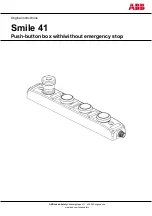
FieldPoint
™
is a trademark of National Instruments Corporation. Product and company names
mentioned herein are trademarks or trade names of their respective companies.
321904B-01
©
Copyright 1998, 1999 National Instruments Corp. All rights reserved. June 1999
OPERATING INSTRUCTIONS
FP-RLY-420
8-Channel, SPST Relay Module
These operating instructions describe the installation, features, and
characteristics of the FP-RLY-420. For details on configuring and
accessing the FP-RLY-420 over a network, refer to the user manual
for the particular FieldPoint network module you are using with
the FP-RLY-420.
Features
The FP-RLY-420 is a FieldPoint relay output module with the
following features:
•
Eight Single-Pole Single-Throw (SPST) relay channels
•
Switching capacity 3 A at 35 VDC or 250 VAC
•
On/Off LED indicators
•
Hot plug and play operation
•
3,000 V input to output isolation
•
Double insulated for 250 V safe working voltage
•
–40 to +70 °C operation
Power Requirement
The FP-RLY-420 is powered via the local backplane bus from the
FieldPoint network module. The FP-RLY-420 is a high-power
consumption module and requires more than the nominal power
allocated to an I/O module from the network module. In some
applications, this could limit the number of I/O modules that you
can connect to a single network module.
When defining a FieldPoint system that uses an FP-RLY-420
module, you must calculate the power consumption. First refer
to the specifications section in the user manual for your network






























